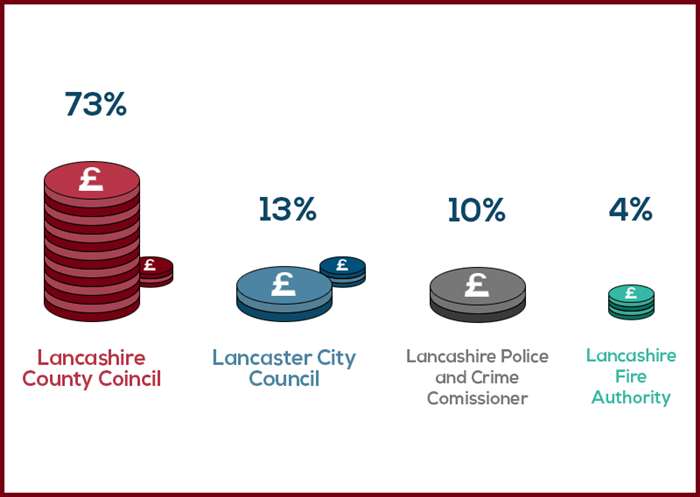Council Tax rise will support investment and protect the most vulnerable
Lancaster City Council will increase its portion of Council Tax by around 13p a week to help tackle inequality, protect services and fund ambitious plans for the future.

We collect Council Tax, but only keep 13% with the remainder going to (excluding parishes) Lancashire County Council, Lancashire Police and Crime Commissioner and Lancashire Combined Fire Authority
From April 2019 households will pay an additional 2.99% a year to the city council.
In real terms this means households will pay an average (based on a Band D property) of an extra £6.59 a year – or 13p a week.
The increase will help to offset funding cuts the council has suffered in recent years, which has seen more than £7million wiped from its budget since 2010.
At the same time it will help to increase investment so that businesses thrive and jobs are created, major regeneration and infrastructure projects are delivered, and issues of health inequality, food and fuel poverty are addressed.
The budget proposals, which were approved on Wednesday February 27, include:
• A public health project coordinator to co-ordinate the council’s approach to tackling food and fuel poverty
• Funding for economic growth initiatives including business and skills support, marketing to raise the profile of the district as a place for business and investment, to study, live and visit, and supporting local wealthbuildingto ensure spending stays in the district
• Extend funding for CCTV and the anti-social behaviour team
• Further development of the mini-zoo area in Williamson Park to improve the standards of the attraction and increase visitors
Coun Anne Whitehead, Cabinet member with responsibility for finance, said: “The council’s budget has fallen by some £7million over the last nine years and at the same time the cost of providing services has increased.
“With that in mind a modest increase in Council Tax is necessary to deliver a balanced budget, maintain service levels, and ensure that we continue to invest in the future of our wonderful district. I’m proud that we have not had to resort to making the major reductions to services that so many other councils have had to do, while also freezing car parking and green waste collection charges.
“We have also maintained the support we provide to vulnerable and low income households through our Council Tax support scheme.
“The Lancaster district has huge potential and ambitious plans such as those for the Eden Project and the Canal Quarter all need investment if they are to be realised. Our budget proposals include items that will boost our economy while protecting the most vulnerable in our communities.”
As 80% of the district's homes are in the lowest bands (A to C) the actual increase in Council Tax will be even lower than 13p a week for the majority of households.
Low income households that receive full Council Tax benefit will not be affected by the small increase. The council has previously agreed that its new local Council Tax support scheme will maintain benefits at current levels.
While as the billing authority Lancaster City Council collects Council Tax, it only receives around 13% of the total bill to spend on its services.
Excluding parishes, of the remaining bill, the majority goes to Lancashire County Council (73%), with precepts from the Lancashire Police and Crime Commissioner(10%) and Lancashire Combined Fire Authority (4%) making up the rest.
Last updated: 28 February 2019
